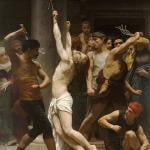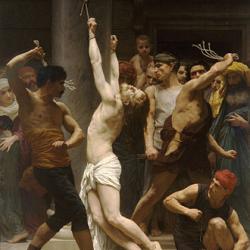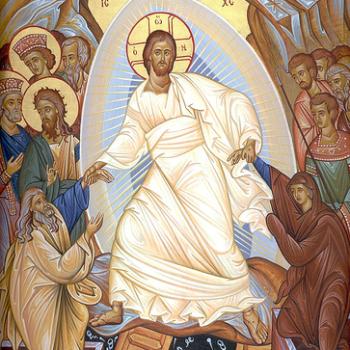In a previous post ‘Mysterious Lives of Christ’, I quoted from
LIFE OF CHRIST (1923) by Giovanni Papini
That book is in the public domain.
Wine and Blood
As soon as they had eaten the lamb with the bread and the bitter herb, Jesus filled the common cup for the third time and gave it to the Apostle nearest Him,
“Drink ye all of it; for this is my blood of the new testament, which is shed for many.”
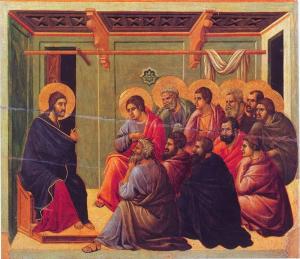
His blood, mixed with sweat, had not yet fallen on the ground, under the olives, and had not yet dropped from the nails upon Golgotha. But His desire to give life with His life, to redeem with His suffering all the sorrows of
the world, to transmit at least a part of His substance to His immediate heirs; this desire to give Himself up wholly for those whom He loves is so great that from this moment on, He feels the immolation complete and the gift possible.
If bread is the body, blood is in a certain sense the soul. The Lord said to Noah:
“But flesh with the life thereof, which is the blood thereof, shall ye not eat.”
With blood as visibly representing life, the God of Abraham and of Jacob had established the covenant with His own people. When Moses had received the law, he had sacrificed oxen, took half of the blood and put it in basins, and half of the blood he sprinkled on the altar:
“And Moses took the blood, and sprinkled it on the people, and said, Behold the blood of the covenant which the Lord hath made with you concerning all these words.”
But after a trial of many centuries, God had announced by the voice of the prophets that the Old Covenant was obliterated and abrogated, and that another was hence forth necessary. The blood of animals sprinkled upon stubborn heads and upon blaspheming faces had lost its virtue; another Blood, purer and more precious, was needed for the New Covenant, for the Last Covenant of the Father with His perjured children. In many ways He
had already tried to lead His first-born towards the narrow door of salvation; the rain of fire on Sodom, the washings of the waters of the flood, the Egyptian slavery, hunger in the desert, had terrified them without reforming
them.
And now there had come a Liberator at once more divine and more human than the old Captain of Exodus. Moses also saved a people, spoke upon a mountain, announced a promised land. But Jesus saves not only His
people, but all peoples; writes His laws not upon stone, but upon human hearts; and His promised land is not a country of rich grazing-land and vineyards, with great clusters of grapes, but a Kingdom of holiness and eternal
joy. Moses had killed a man, and Jesus brought the dead to life; Moses changed water into blood and Jesus, after having changed water into wine at the wedding banquet, changed wine into blood, into His own blood, at the
melancholy last supper of His marriage with death. Moses died full of years and honors on a solitary mountain top, glorified by his people; and Jesus was to die among the insults of those whom He loved.
The blood of oxen, the impure blood of earthly animals, involuntary and inferior victims, is no longer sufficient. The New Covenant was established that night with the words of Christ, who under the appearance of wine shed
His own blood and His own soul:
“This cup is the new testament in my blood, which is shed for you.”
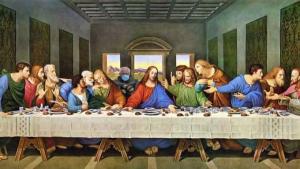
It was shed not merely for the Twelve who were there; they represent in His eyes all of humanity alive at that time and all those to be born thereafter. The blood which was to be shed the next day, on Golgotha, was real blood,
actual, warm blood congealing on the cross in clots which all the tears shed by Christians can never wash away. But the blood of the Last Supper symbolizes a soul which gave itself up to make over into His own likeness, the souls shut up in the bodies of men: which was given to those who asked for it and to those who fled away from it, which had suffered for the sake of those who had received it and for those who had blasphemed it. This baptism of blood which came after the baptism of water by John, after the baptism of tears by the women of Bethany, after the baptism of spitting by the Jews and by the Romans, this baptism of blood, red as the baptism of fire announced by the prophet of fire, and mixed with the tears shed by women over His blood-stained body, this is the greatest sacrament, revealed to His betrayers, by Him who was betrayed.
I have broken bread for you, daily bread for which you pray every day to the Father, as my body will be broken to-morrow, and I offer you now my blood in this wine which I drink for the last time on earth. If you always
do this in memory of me, you will feel no hunger, no thirst. There is no food better than wheat bread, and no drink better than wine, but the bread and wine which I have given you to-night will feed you and quench your
thirst for all your lives, by virtue of my sacrifice and of that love which makes me seek for death and which reigns beyond death.
Ulysses advised Achilles to give the Achaians, before they went into battle, “bread and wine that they should have strength and courage.” For the Greek the strength of his members came from bread and homicidal courage
from wine. Wine was to intoxicate men so that they should destroy each other and bread was to strengthen their arms so that they could battle without weakness. The bread given by Christ does not strengthen the flesh, but the
soul, and His wine gives that divine intoxication which is Love, that Love which the Apostle, scandalizing the descendants of Ulysses, was to call in his Epistle to the Corinthians, “the foolishness of God.”
Judas also ate that bread and swallowed that wine, partook of that body, in which he had trafficked, drank that blood which he was to help shed, but he had not the courage to confess his infamy, to throw himself down weeping
at the feet of Him who would have wept with him. Then the only friend remaining to Judas warned him,
“Verily I say unto you, that one of you shall betray me.”
The eleven were capable of leaving Him alone in the midst of Caiaphas’ guards, but they never could have brought themselves to sell Him for money, and at this they shuddered. Every one looked in his neighbor’s face, almost dreading to see in his companion the livid look of guilt, and all, one after the other, said,
“Lord, is it I?”
Even Judas, hiding his increasing confusion under the appearance of offended astonishment, was able to force his voice to say,
“Lord, is it I?”
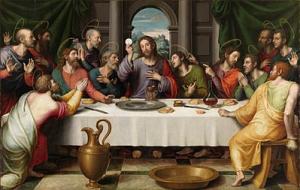
But Jesus, who the next day would not defend Himself, would not even bring an accusation and only repeated the sad prophecy in more definite words,
“He that dippeth his hand with me in the dish, the same shall betray me.”
And while they all still gazed at Him in painful doubt, for the third time He insisted, . . . “
The hand of him that betrayeth me is with me on the table.”
He added no more, but to follow the old customs up to the last, He filled the cup for the fourth time and gave it to them to drink. And once more the thirteen voices rang out in the old hymn, the “great hallel”
which ended the liturgy of the Passover. Jesus repeated the vigorous words of the Psalmist which were like a prophetic funeral oration for Him, pronounced before His death.
“The Lord is on my side; I will not fear; what can
man do unto me ? … They compassed me about like bees:
they are quenched as the fire of thorns. … I shall not
die, but live…. The Lord hath chastened me sore: but he
hath not given me over unto death. Open to me the gates
of righteousness: I will go into them, and I will praise
the Lord: . . . The stone which the builders refused is
become the headstone of the corner. . .. Bind the sacrifice
with cords, even unto the horns of the altar.”
The victim was ready and the next day the inhabitants of Jerusalem were to see a new altar of wood and iron. But perhaps the Disciples, sleepy and confused, did not understand the new meaning both melancholy and triumphant of the old canticles. When the hymn was ended they left the room and the house, at once. As soon as they had emerged from the house Judas disappeared into the night. The remaining
eleven silently followed Jesus, who, as was His wont, made His way to the Mount of Olives.


